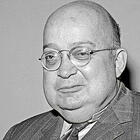
American journalist closely associated with The New Yorker from 1935 until his death. He began his career as a journalist for the Evening Bulletin, Providence, Rhode Island. He worked briefly in the sports section of the New York Times, but was fired and lived in France until 1935, when he returned and joined The New Yorker. During World War II, he worked as a war correspondent and signed many stories from Africa, England and France. His war articles are collected in The Road Back to Paris (1944). He participated in the Normandy landings on D-Day, and wrote a memorable piece about his experiences under fire aboard a U.S. Coast Guard landing craft off Omaha Beach. He then spent two months in Normandy and Brittany and was with the Allied forces when they reached Paris. Liebling received the Cross of the Legion of Honour from the French government for his war information. At the end of this, he returned to the magazine and began writing a column called "Wayward Press", in which he analyzed the American press. Liebling was also an avid admirer of boxing, horse racing, and food, and wrote about these topics frequently. During the 1940s, he actively and forcefully criticized the House House Un-American Activities Committee.




